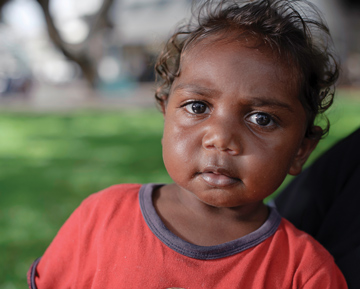In 2016, with enabling donations from Denby Roberts, Stan Perron, Wesfarmers and Centurion, the Institute established a permanent presence in the Kimberley.
Our aim was to be closer to the children, families and services we work with, and to have Kimberley communities come to see us as a committed, familiar and trustworthy partner. Only in this way could we work closely on the child health issues they felt were most critical. We call our presence there The Kids Kimberley.
Based in Broome, The Kids Kimberley provides a launching site for cutting-edge, place-based research across Western Australia’s north.
Our presence in the Kimberley also provides the opportunity to deliver on our commitment to build capacity, and in particular create research career opportunities and pathways for Aboriginal people to work in their own communities.
John Jacky, a local Aboriginal man based in Broome and coordinating The Kids Kimberley, says our researchers have the opportunity to work closely with communities, families and Aboriginal Community Controlled Health Organisations.
"We want to ensure that research is appropriate, respectful and culturally-responsive and leads to better health policy, services and support that engages and responds to the needs of local Aboriginal children and families," says John.
"This is something that has previously been difficult to do with the 'fly-in, fly-out' nature of past research."
But what sort of research is necessary? After all, the people of the Kimberley are proud, have a strong sense of identity and culture, and many families are thriving.
However, a complex interplay of socio-economic factors, disempowerment and the legacy of colonisation and government policies has meant there are a number of families who are struggling. This is reflected in significantly poorer health outcomes for Kimberley Aboriginal children throughout childhood and into adulthood.
For example, 44 per cent of Aboriginal children in the Kimberley were rated as developmentally vulnerable in the 2015 Australian Early Childhood Census, as compared to the State average of 23 per cent.
Aboriginal children in the Kimberley suffer higher rates of ear, skin and lung infections and the serious lifelong conditions that can result from these infections such as kidney disease, rheumatic heart disease, permanent hearing loss and premature death. And the rates of Aboriginal youth suicide and self harm in the Kimberley are more than seven times the national average.
John says developing meaningful community-led strategies that empower families and services to respond to such issues requires strong partnerships between communities, health services, researchers, government agencies and non-government organisations.
"We understand that and that is why we’re here," says John.
"Happily, The Kids is not going it alone in the Kimberley."
Since setting up in Broome, we have developed an important collaboration with the Kimberley Aboriginal Medical Services and its members, including the Broome Regional Aboriginal Medical Service, Derby Aboriginal Health Service, Ord Valley Aboriginal Health Service, Yuri Yungi Aboriginal Health Service in Halls Creek, and the Nirrumbuk Environmental Health and Services.
"We have agreed that all parties in this collaborative agreement will help will finalise a process for introducing and co-designing research to be conducted together in the future," says John.
"We believe the promise of good health and education should exist for all children, and are especially concerned about the vulnerable children and families in the Kimberley.
"We know that by working in close partnership with communities we have every opportunity to make a difference in the lives of all children.
"We will be able to bring about real changes on the ground. And this is ground we now share."
What's next?
The Kimberley communities have been supportive of our presence. They have also been responsive. Through the first ever Kimberley Aboriginal Child and Family Health Research forum co-hosted with the Kimberley Aboriginal Medical Services last year, attendees shared with us what research we could do together that would be most meaningful to them going forward.
- How do we build resilience in our young people in order to reduce self-harm and suicide?
- What can we do for our children now that will prevent chronic diseases in their later years?
- What are the best strategies for preventing infectious diseases?
- Are there ways health services can increase their effectiveness and improve service delivery?
- How do we develop culturally-informed parenting skills programs that support families and adequately prepare young children for school?
Our researchers will be working on these significant research questions in the coming years.
The Kids Kimberley is supported by Denby Roberts, Stan Perron, Wesfarmers and Centurion.
